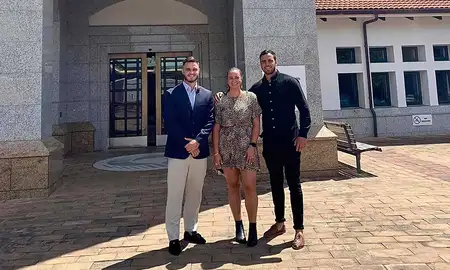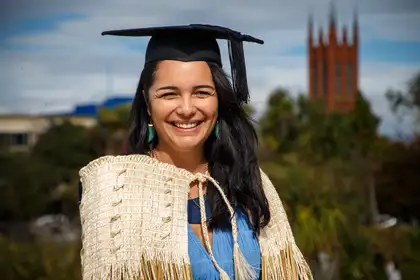
Keita Durie, Ngāti Kauwhata, Rangitāne, Ngāi Te Rangi.
After three years of working as a primary school teacher and while 38 weeks hapū (pregnant) with her second tamaiti (child), Keita decided to continue her academic journey. She began studying towards a master’s part-time while navigating being a mother of two children under two. By the second semester, Keita returned to work part-time as a bilingual primary school kaiako (teacher).
Keita excelled with her grades and says she enjoyed the course papers, particularly those that focused on Māori.
“Learning about the severity of colonisation in Aotearoa New Zealand for Māori was significant, especially considering the immeasurable impacts it continues to have on ākonga Māori (Māori students) today.”
After taking a break from study in 2020 to return to full-time teaching, Keita was granted a TeachNZ study award in 2021 that provided her a year of paid leave. She chose to study te reo Māori as part of her own reclamation journey and says she experienced stories from her classmates about the depths of their language trauma which emphasised the on-going impacts of colonisation.
Keita welcomed her third pēpi (baby) in 2022 and decided to utilise her maternity leave to complete her master’s. In her final year, she focused on conducting a professional inquiry which explored the experiences of Māori principals in English-medium secondary schools and what practices they believe contribute to the success of ākonga Māori.
“I really enjoyed the field work element and listening to the rich kōrero from participants who were all Māori. It was in that moment when I realised the importance of rangahau (research), especially in Māori education settings. I now see rangahau as an opportunity to provide a platform for Māori to have their voices heard and their whakaaro (thoughts) valued,” Keita says.
Keita is passionate about Māori education and says she holds a lot of hope for the future.
“I hope to see more tamariki Māori and their whānau choosing to go through Māori education settings such as Kōhanga Reo, Kura Kaupapa Māori, Kura ā-Iwi and Wharekura. These Māori education settings should be truly valued and well-resourced. I also hope we see transformational change in leadership and governance that is grounded in Te Tiriti o Waitangi and genuinely reflects our nation’s bicultural partnership and a re-indigenised Aotearoa. What I’d like to see most is all tamariki Māori growing up knowing how to speak te reo Māori, knowing who they are, where they come from and feeling really proud to be Māori.”
The 28-year-old will be continuing her studies with Massey as she starts a PhD and says it will be a case study on Manukura.
“I’m interested in building on my previous rangahau and exploring the experiences of graduates and what practices and/or principles they believe contribute to the success of ākonga Māori. This will be qualitative research, underpinned in Kaupapa Māori methodology, with the main data collection instrument being interviews.”
Keita plans to study part-time while continuing her current role at Te Rangahau Mātauranga o Aotearoa – New Zealand Council for Education Research (NZCER) in the Māori unit, Te Wāhanga, as a kairangahau Māori (Māori researcher).
“NZCER has strategic priorities including Whakamana Māori, Decolonising Education and Equity, which connects with my PhD rangahau enacting these priorities. I feel very fortunate to be in an environment that is supportive of me undertaking this rangahau.”
Keita’s research interests include Kaupapa Māori methodology, Māori education settings, mātauranga Māori and te reo and tikanga Māori revitalisation. Her most recent publication is ‘Ngā whai pāinga o Te Ao Haka – The positive impacts of Te Ao Haka for ākonga, whānau and kaiako’ and she is currently co-leading a new project called Wāhine Māori in Leadership.
Alongside her mahi and rangahau, Keita devotes her time to her whānau including her tāne (husband) Richard, Ngāti Pikiao, and her three sons, five-year-old Taihākurei, four-year-old Maioro and one-year-old Te Maire.
Keita says the most important thing for future tauira (students) to remember is perspective is everything and that having a good support system makes all the difference.
“I’d like to thank my tāne for his ongoing support and our tamariki, who I did this for. I want them to know they can achieve whatever they put their mind to, just like their māmā. I’d also like to thank my aunty Ilane Durie. We started this degree together and she was a go-to for me throughout. Also, my English teacher from high school, Irene Pewhairangi, who was a critical friend who always made time to review my assignments and offer feedback, and my whānau for offering up advice and perspective. He toa takitini.”
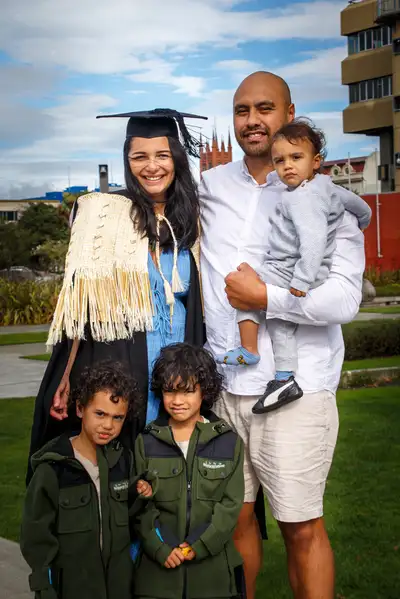
Keita with her tāne Richard, Ngāti Pikiao, and her tamariki, five-year-old Taihākurei, four-year-old Maioro and one-year-old Te Maire.
Related news
Sharing the mana through connecting passions
Talia Brewer, Te Ātiawa ki Whakarongotai, Ngāti Raukawa ki te Tonga and Ngāti Toa Rangatira, Ngāti Ruanui, Ngā Ruahine, is graduating not only with a Master of Applied Social Work but with a reinforced sense of self and purpose.
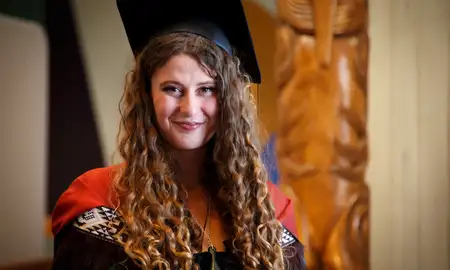
Finding drive in a new perspective
With the pandemic delaying his plans to travel overseas, Matt Tini, Waikato, Ngāti Tiipa, Ngāti Rākaipaaka, Ngāti Kahungunu, decided to broaden his horizons by continuing his academic journey.
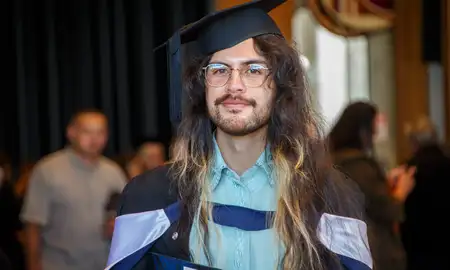
Online te reo Māori programme takes off
An idea to help keep whānau connected and tamariki engaged and learning has really taken off since New Zealand went into COVID-19 lockdown.
